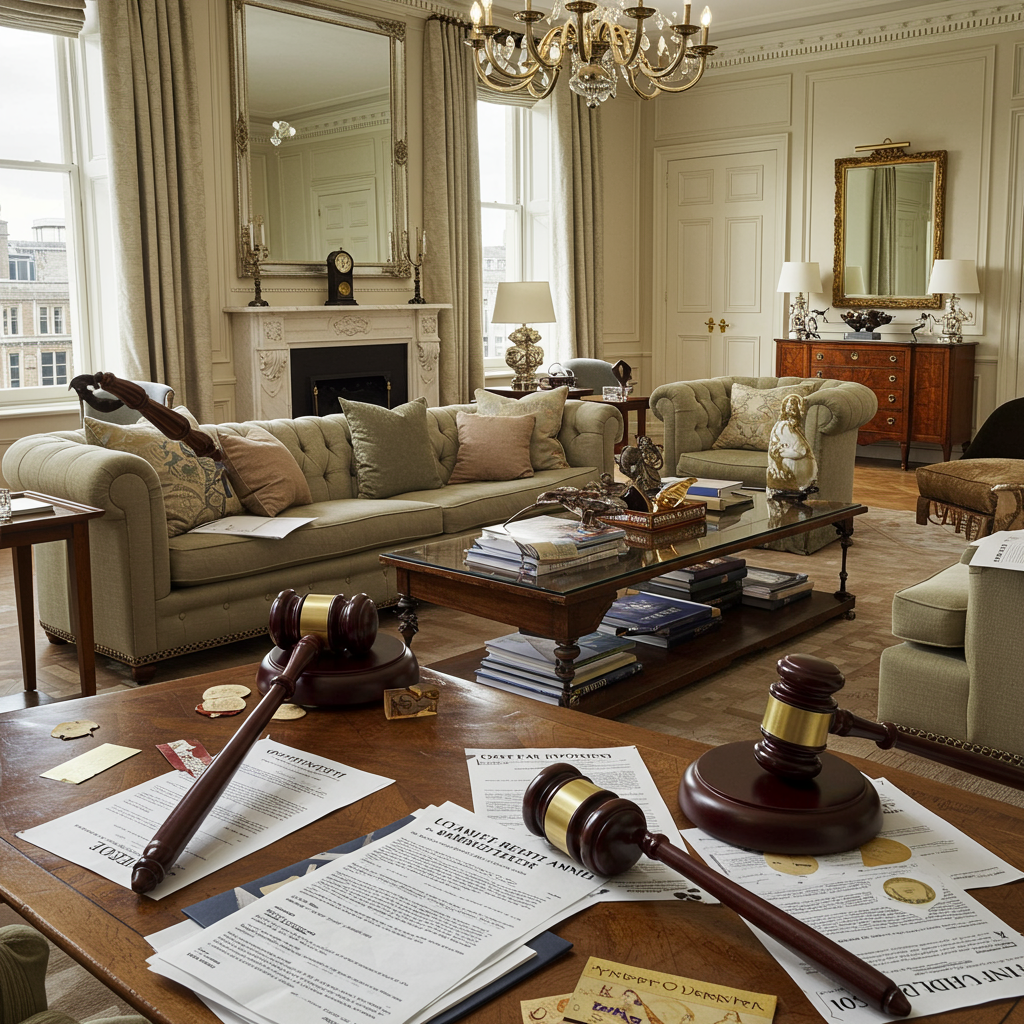An eight-year legal conflict is unfolding in central London’s exclusive Mayfair district. A multi-million pound penthouse owner at 55 Park Lane is locked in a bitter dispute with companies tied to the late Mohamed Al Fayed and his family. This protracted legal battle, documented in High Court filings, involves allegations ranging from leaky roofs and noisy lifts to thwarted renovation plans. The case offers a rare glimpse into the complex property dealings within the Al Fayed empire, a subject gaining increased scrutiny following Mohamed Al Fayed’s death.
The Setting: A Prized London Address
The building at the heart of this dispute is 55 Park Lane. Known as “Hyde Park Residence,” it occupies a prime spot adjacent to the prestigious Dorchester Hotel. Promotional materials for the building promise tranquility and upscale London living. An apartment with four bedrooms in the building is currently listed for sale at a significant £8.5 million. Historical accounts, like a 2003 description in the Mail on Sunday, lauded its “sensational” Hyde Park views and stunning marble entrance.
However, the building’s outward appearance today tells a different story. Peeling paint and a missing sign suggest a less polished reality than its luxury status implies.
Ownership Structure of 55 Park Lane
The Al Fayed family has controlled Hyde Park Residence since the 1980s. This is managed through Prestige Properties (PP), a company based in Liechtenstein. Following Mohamed Al Fayed’s passing in 2023, control transferred to his estate and family. His widow, Heini Wathen-Fayed, serves as a director for the UK subsidiary, Hyde Park Residence Ltd. This subsidiary manages certain apartments within the building. Reports indicate Mohamed Al Fayed’s son, Dodi, who died with Princess Diana in 1997, once had a flat here. Mohamed Al Fayed also reportedly allowed managers and directors from his Harrods business to reside in this block and the adjacent 60 Park Lane, which he also owned. (Note: A separate BBC investigation in 2024 reported on sexual assault allegations against Al Fayed at 60 Park Lane.)
The building’s land is technically owned by the Grosvenor Estate. This estate holds extensive property across central London. The Al Fayed family’s company, PP, holds a leasehold interest. This grants them the right to use the property for the next 110 years. While time-limited, this leasehold arrangement is considered a form of ownership in property law.
The Penthouse Owners and Early Issues
The luxury penthouse at the centre of this Park Lane penthouse legal battle belongs to Alan and Rosaleen Hodson. Mr. Hodson is a property developer with a history of building many homes in south-east England. They purchased the top-floor apartment in 2004. The Hodsons undertook significant improvements upon moving in. These renovations included modifying the kitchen and upgrading the roof terraces. Crucially, they installed a new private lift. This lift provided direct access to their apartment, eliminating the need for stairs.
According to court documents, the first issue arose shortly after their purchase. Mr. Hodson claims Prestige Properties failed to honor an agreement. This agreement related to updating his lease. The update was necessary to grant him legal ownership of the new private lift.
Adding to the early complications, required permissions for the Hodsons’ improvements were not initially sought from the Grosvenor Estate. Retrospective permission was later granted in 2006. This required a payment of £100,000, which Prestige Properties paid. Years later, this payment would become another point of contention in the unfolding Al Fayed family property dispute.
Escalation: Noise, Demands, and Lawsuits
The situation at Hyde Park Residence deteriorated further over the next few years. By 2014, the Hodsons began complaining about noise emanating from two of the building’s communal lifts. Despite their repeated complaints, the noise reportedly worsened. In 2015, building managers agreed to suspend the use of one particularly troublesome lift during nighttime hours.
Then, in 2016, the relationship between the Hodsons and Prestige Properties soured significantly. PP demanded that Mr. Hodson contribute £80,000 towards the £100,000 sum paid to the Grosvenor Estate back in 2006. This demand intensified the existing friction.
The escalating disputes prompted the Hodsons to take formal legal action. In 2017, they filed a case against PP and two other Al Fayed-controlled companies in the High Court. Their lawsuit detailed a list of grievances. They sought damages to address the numerous issues they claimed had arisen.
Core Grievances Detailed
Among the Hodsons’ key complaints was a claim related to extending their flat. Mr. Hodson stated he had planned to add an additional floor to the penthouse. He had reportedly invested £180,000 in developing these extension plans. His lawyers claimed Prestige Properties initially encouraged this plan. However, PP later denied him permission to proceed with the build. PP’s lawyers countered this specific claim. They argued that the company had never formally granted Mr. Hodson permission to extend. They also contended that, as an experienced property developer, he should have understood that obtaining permission from the landlord (PP) for such a significant modification would require a payment of potentially millions of pounds.
The Hodsons also alleged the noisy communal lift issue had been weaponized. Mr. Hodson claimed that after he sent a letter of complaint, PP allowed the use of the noisy lift to resume. He believed this was a “malicious and deliberate” act intended to disturb his sleep. As evidence, he cited one specific night. He claimed the lift was used 23 times between midnight and 2:00 am.
Furthermore, the lawsuit highlighted persistent maintenance problems. The Hodsons complained of poor repair work. This allegedly resulted in a leaky roof over their penthouse. They also reported damage to their roof terraces due to inadequate upkeep.
The Al Fayed Companies’ Response and Counterclaim
Prestige Properties and the other Al Fayed-controlled companies have vigorously defended themselves against the Hodsons’ accusations in court filings. Regarding the lift noise, their lawyers argue that the noise levels are within “acceptable levels.” They explicitly deny that the lift was restarted or used with any malicious intent to disturb the Hodsons.
Concerning the water leaks, PP’s legal team admits that water did leak. However, they maintain that their clients have subsequently taken all reasonable steps required to stop it.
Adding another layer to the complex Mayfair legal row, Prestige Properties has filed a counterclaim against the Hodsons. PP is seeking payment of £344,000 in outstanding ground rent. They are also demanding an additional £286,000 in interest and associated costs.
A Dispute Reflecting a Legacy
The protracted nature of this specific Park Lane penthouse legal battle is notable. The sums involved, while substantial to individuals, appear relatively small compared to Mohamed Al Fayed’s estimated £1.7 billion wealth at the time of his death. Despite the seemingly trivial nature of the financial demands in the context of a vast estate, the dispute has dragged on for an remarkable eight years.
This lengthy and combative legal fight appears to echo Mohamed Al Fayed’s own well-known approach. Throughout his life, he was characterized by a determined, often litigious, style when dealing with disagreements. The persistence of this particular conflict suggests that this fiercely contested approach continues even after his passing. The management of his estate properties seems to reflect this legacy.
As of March 2024, the dispute remains unresolved. A recent court filing from Mr. Hodson indicated the ongoing nature of the problems. He stated that the roof was “still leaking.” He also claimed the lift was “still making excessive noise.” Furthermore, he noted that refurbishment work on the building’s corridors and lobby had “never been finished.”
Lawyers for all parties involved in the luxury property dispute declined to provide comments on the ongoing legal proceedings.
Frequently Asked Questions
What are the main complaints in the Park Lane penthouse legal battle?
The core complaints in the 55 Park Lane legal battle by the penthouse owners, the Hodsons, involve several issues. They allege problems with noisy communal lifts, particularly after hours, and claim one lift was used maliciously to disturb them. They also complain about building maintenance failures, specifically a leaky roof over their apartment and damage to roof terraces due to poor repair work. Additionally, they claim the Al Fayed companies initially encouraged but then unfairly denied their plans to extend the penthouse.
Who are the key parties involved in the 55 Park Lane property dispute?
The main parties in this high-profile leasehold dispute are the owners of the penthouse, Alan and Rosaleen Hodson, and companies controlled by the late Mohamed Al Fayed and his family. These companies include Prestige Properties (PP), based in Liechtenstein, and Hyde Park Residence Ltd, a UK subsidiary. Mohamed Al Fayed’s widow, Heini Wathen-Fayed, is noted as a director of the UK company. The Grosvenor Estate is also a background entity as the freeholder of the building’s land.
Why has the Park Lane penthouse legal dispute lasted so long?
The Park Lane penthouse legal battle has stretched for eight years due to several factors. It began with complex disagreements over legal agreements related to property modifications (like the private lift). The dispute escalated over time to include multiple issues, from maintenance failures like leaky roofs and noisy lifts to financial demands and denied renovation plans. The sheer complexity of the grievances and counterclaims, coupled with the notoriously combative approach often associated with Mohamed Al Fayed’s past dealings and the persistence of this style by the parties now managing his estate, contributes significantly to the prolonged nature of the legal proceedings.
Conclusion
The legal confrontation over the penthouse at 55 Park Lane highlights the complexities and potential frustrations that can arise even in the most exclusive London property settings. An eight-year fight involving a multi-million pound residence and companies linked to a renowned billionaire’s estate underscores the deep disagreements that have taken root. From noisy lifts to leaking roofs and millions sought in counterclaims, the case reflects a determined legal battle on both sides. As confirmed by recent court filings, the dispute remains active, demonstrating the persistent nature of the issues and the enduring impact of past business approaches on present-day affairs within the Al Fayed property holdings.



